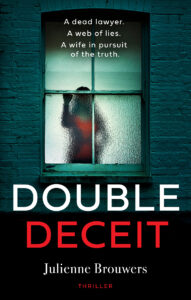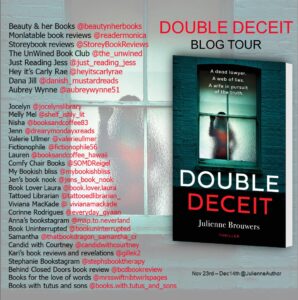 Happy Monday, readers. Today’s special guest is author Julienne Brouwers to chat with me about her new thriller, Double Deceit.
Happy Monday, readers. Today’s special guest is author Julienne Brouwers to chat with me about her new thriller, Double Deceit.
Bio:
Julienne Brouwers worked as a pharmaceutical scientist and medical physicist before becoming a writer. She lives in the Netherlands, with her husband and three children, where she has published two successful thrillers, and lived in the UK and US for a total of four years.
Welcome, Julienne. Please tell us about your current release.
Double Deceit is a somewhat ‘softer’, yet gripping and addictive thriller. Once you start reading you don’t want to put it down anymore (from what I’ve been told). It’s a thriller at heart, filled with many twists and turns, but there’s also a wonderful element of romance, and a deeper message touching on the transient nature of life.
What inspired you to write this book?
My main characters are Jennifer, a family doctor, and her husband Oliver, who is a hotshot lawyer. I lived in Amsterdam as a young professional when I started writing this book, when I had my first job after finishing my PhD. Although I didn’t have any children back then, my life was in some ways comparable to the main character (although I wasn’t living in such a high-end neighbourhood 😊). I’ve worked in a hospital for about seven years, worked with quite a few doctors so that gave me enough input. While living in Amsterdam I took the train every day from the financial district, which plays an important role in the book and which is where Oliver’s law firm is based, and witnessed many of the hotshots that work there.
Jennifer is a girl from the province, coming from a warm but very ‘average’ family. Her husband Oliver has quite a wealthy background and although they both led the urban, young professional life when they met, it turns out their different backgrounds have left a mark on their perspective on life.
Excerpt from Double Deceit:
Around half past nine, to my relief, I had a ten-minute gap in my programme during which I quickly got another cup of coffee.
Once back in my room, I sat down on my chair, took my mobile phone out of my pocket and dialled the number.
“Armstrong,” he barked.
“Good morning detective. This is Jennifer Smits speaking. You called me earlier this morning. You wanted to have a word with me about the investigation into my husband’s death, Oliver?” At first impulse I’d felt surprised that the police considered his death suspicious. However, I knew professionally that they were obliged to perform an investigation and after giving it more thought I was happy that they wanted to rule out any foul play.
He paused for a moment. “Yes, yes,” he stammered, in a friendlier tone.
I heard the rustling of paper in the background as I took a sip of my coffee.
“We’ve received all the test results. I’m happy to inform you we’ve discovered nothing abnormal. The toxicology tests didn’t reveal the presence of any drugs or medication. The autopsy on your husband’s body was also entirely in line with our expectations.” The detective coughed and then carried on summarising his findings. “No traces of violence were found. Neither on the body, nor at the location where your husband was discovered. Finally, no foreign forensic material was detected.”
I hooked my feet around the chair legs and leaned backwards, mumbling a few words of relief.
“Your husband had a large wound on the back of his head that matched the rock he landed on. In all likelihood, he became unconscious almost instantly after his fall and died as a result of severe blood loss from his head injury. I feel therefore confident to conclude that your husband’s cause of death was related to an unfortunate chain of events after an accidental fall. He just had terrible luck, to summarise it bluntly.”
His words echoed through my mind. Unfortunate chain of events… Terrible luck…
How was it possible that he’d plummeted down the slope with such force that his injuries were fatal, I wondered. It was hardly the edge of a cliff or a steep mountainside. Perhaps he’d been all worked up by our argument to the point of becoming reckless.
“Mrs Smits, are you still there?”
I snapped to attention. “Yes, I am,” I quickly said.
“Is everything clear?”
I closed my eyes and rubbed my face. “I guess so,” I responded, although I wasn’t sure whether to be relieved with this conclusion or not. Oliver’s death just seemed even more senseless.
“So what happens now? Is this it?”
“Yes. We’ll finalise our report, for which we won’t need your help. You can come over to our office and collect your husband’s personal belongings. I’ll leave them for you at the reception. If anything else comes up, we’ll contact you. Although that seems unlikely.”
“Thank you so much for your explanation and efforts.”
“At your service. I wish you all the best.”
I was ready to hang up when Detective Armstrong interjected, “Oh yes, one more thing.” After a short pause he continued, broaching an odd topic. “Well, it may be a bit of an impertinent question I suppose … but were you by any chance aware of your husband preferring certain types of underwear?”
I wondered if I’d misheard. “Certain types of underwear?”
“Did he have a rather distinct, unusual taste in this area?” His voice sounded as if he felt as uncomfortable as I was with this conversation.
“Not a chance,” I assured him.
“He didn’t have, er … dare I say a fetish, as they call it nowadays?”
What was this man talking about? “He always wore normal boxer shorts. You know, typical men’s underwear. Why are you asking?”
“Right,” he mumbled and then paused for a brief moment. “That’s peculiar. Your husband was wearing red, lace knickers when he died. They appeared to be ladies underwear.”
I felt utterly gobsmacked. A long awkward silence filled the air as I took it all in. “This doesn’t make any sense. He never wore anything like that.” What was that man thinking? Was he taking the mickey out of me? Surely, he wasn’t inferring that my husband wore my underwear, or worse, that he’d get turned on by it?
“I see. Perhaps your husband may have liked to wear your knickers. Or he may have bought a pair for himself to give it a try. Trust me, this seems quite normal compared to the situations I’ve encountered. You wouldn’t believe the things I come across. Just when I think I’ve seen it all, a unique situation will present itself that knocks my socks off. There are a lot of weird people out there. Sometimes I wonder if I should quit and be done with the absurdity, or rejoice in the quirkiness of my job.”
I felt lost for words. “But how …” I stammered.
“Very well. Not to worry. Mrs Smits, you take care now. I wish you and your son all the best. Goodbye.”
Before I could even respond, he’d hung up.
What exciting story are you working on next?
Another thriller with a strong woman in the lead. This time it will be a much more complicated character, with a troubled past. Also, radiation sources, that I used to work with for a few years, will play a part in it…
When did you first consider yourself a writer?
For me, this has been a slow process. The first book was written while I was still having an almost fulltime job, so I regarded it as a hobby (that got out of hand!). But during the last few years, I’ve noticed I introduce myself as a writer when people ask about it.
Do you write full-time? If so, what’s your work day like? If not, what do you do other than write and how do you find time to write?
I spend between ten to twenty hours per week on writing. I also work a day a week as a technical consultant. Besides that, I like to spend as much time as possible with my three young children.
What would you say is your interesting writing quirk?
Gosh, that’s a hard one. I’m not sure I really have a quirk. I write a rough version quite quickly and then go over it multiple times to edit. Also, when I’m in the middle of writing a book, I’ll jot down all interesting phrases and expressions whenever I’m watching a series on Netflix or reading a good book and put them all together in an excel file. When I see something peculiar happening around me (could be anywhere, for example when doing groceries), I make a note of it in my phone or email it to myself and try to use it somewhere in my book.
As a child, what did you want to be when you grew up?
I initially wanted to become a (medical) doctor, but then I turned out to be good in science, so I ended up studying biomedical engineering. I’ve always had a soft spot for language though, in particular for the English one. I am Dutch born and (mostly) raised, but have spent in total four years in the UK and US (Berkeley and Boston), so that probably has something to do with it. Being a writer now, I can be more creative and the work is much more flexible than in the job I used to have, which is wonderful.
Anything additional you want to share with the readers?
The book was originally Dutch and was translated into English after being very successful over there. I’m really excited to hear what readers in the US think about it. So please do leave a review or send me an email (listed at the end of the book)!
Other than that, I wish for all your readers to stay healthy.
Links:
Instagram | Twitter | Facebook | Goodreads | Amazon US | Amazon CA
Thanks for joining me today!
To learn more about Julienne and her writing, visit some of her other tour stops!

